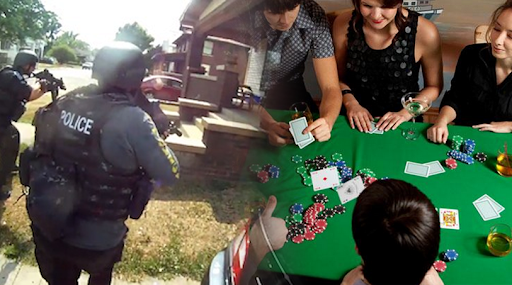
While it seems that there are great hopes for a vaccine soon, the immediate situation regarding the coronavirus-19 (COVID-19) outbreak and pandemic remains a fluid one. Many locales still have stringent guidelines regarding gatherings of certain sizes. You might think a poker game would be able to avoid this type of situation but, in Canada, that proved this to not be the case.
Serious Fines Arise from Poker Game
Last weekend, a Kamloops, Canada, man decided to hold a poker game for him and his friends. The normal ten-handed game was seated and, as the night worked into the next morning, the host was seemingly doing well. That was until the Kamloops Royal Canadian Mounted Police (RCMP) arrived on the scene.
Acting on an anonymous tip, the Kamloops RCMP decided to pay the poker game a visit, where the homeowner and nine of his friends were playing poker. From police reports, none of the players were wearing any masks nor was there any other sanctioned sanitary actions taking place. What happened next probably caused the police to act.
The RCMP report that the homeowner “did not cooperate” with the officers who responded to the anonymous tip, forcing them to arrest the homeowner for obstruction of a police officer and immediately disperse the game. The other players taking part in the poker game were allowed to leave and, following the departure of his guests, the police then released the homeowner on his own recognizance. But it didn’t save him from several fines levied against him.
Almost $3000 (Canadian) in fines were handed out to the homeowner for varying violations of local code. Those included a “contravention of gatherings and events order ($2300),” failure to comply with law enforcement ($230), encouraging attendance at a non-compliant gathering ($230) and abusive or belligerent behavior ($230).
“It is disheartening when our police officers have to attend such gatherings putting themselves at risk of catching COVID-19 and bringing it home to their families when it can be avoided,” Supt. Syd Lecky stated after the arrest was complete. “The uncooperative nature of the homeowner just makes this even more troublesome.”
Good and Bad in the Situation
While some would say this is a gross overstep of what law enforcement is supposed to do, it is exactly why they are there. LEOs across the U. S. and Canada are entrusted to enforce the laws of the land. It not only protects the citizens of their area but also keeps order and safety in the areas they are supposed to protect.
Now there is the other side of the equation – that there are better things that the police could be doing – but the reality is that the homeowner was technically violating the law. The police acted on a report from a citizen and it sounds as if the homeowner acerbated the situation through his (or her?) actions. There are some things to remember when you’re holding a poker game, COVID-19 or no COVID-19 rules in effect.
If you’re holding a poker game, be sure you know the laws in your area. While many areas will allow for a “friendly” poker game, they’re not going to allow a high stakes operation to be going on. This is where many people go wrong in that they start charging players to play, by having a rake or a time charge, and it is forbidden in most areas to do this.
Second, check with your neighbors. If they’re OK with having several cars on the street for a few hours on a Saturday night, they’re not going to be calling the cops. Likewise, try to keep the festivities to a low roar; even though it is a Saturday night, sometimes people like to sleep early!
Finally, if the police do show up at your door, don’t act like a jerk. While knowing your legal rights is an important thing, the foyer of your home isn’t a courtroom – you’re not going to litigate the case there. As Patrick Swayze’s James Dalton (yes, Dalton was his last name) says in Road House, “Be nice…” You will only make the situation worse for you if you do anything other than “be nice,” as this homeowner in Canada found out.























